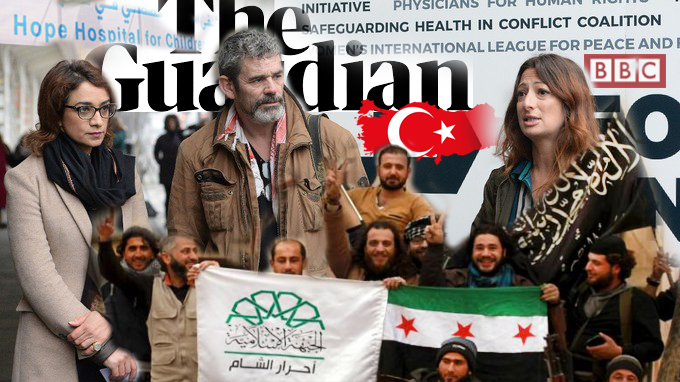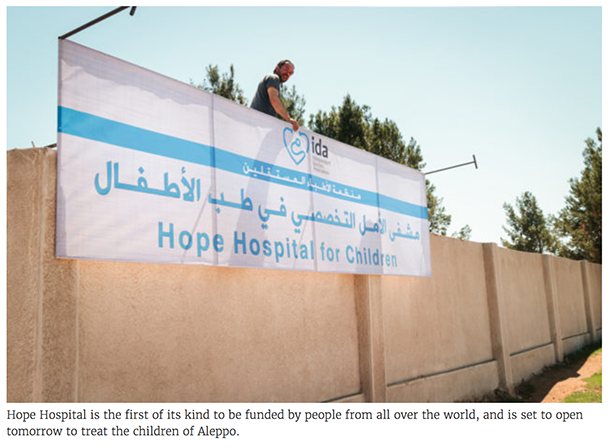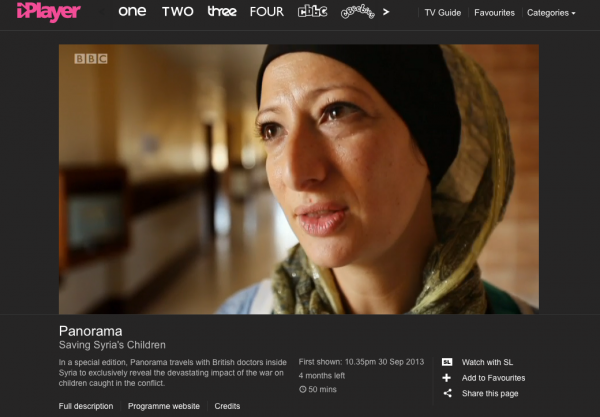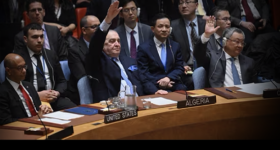
Steven Sahiounie
21st Century Wire
Too often we see reports in the western mainstream media about Syria which are distorted and hardly resemble the reality on the ground. What’s worse however, is when misleading stories are used to extract money from unwitting western audiences.
The Guardian published a ‘feel good’ story about a Syrian refugee chef in London, who is cooking to support Hope Hospital in Aleppo. The claims in the article bear scrutiny.
For example: “…. Hope Hospital, which has saved tens of thousands of lives in Aleppo.”
Another claim: “It is the only paediatric hospital in the Aleppo region, serving more than 250,000 people.”
From these details, the readers will come away with the understanding that “Hope Hospital” is a worthwhile charity, which is located in Aleppo, Syria and which is the only children’s hospital in the area. However, such claims are not supported by facts.
“Hope Hospital” is not located in the city of Aleppo. The mainstream media covered the battles of East Aleppo for months in 2016, culminating in the December 2016 evacuation of all armed fighters and their families from East Aleppo, and the evacuation of most besieged civilians to West Aleppo, as a result of the Syrian Arab Army taking control of East Aleppo after years of armed fighters having occupied it.
Aleppo is the most populous city in Syria: beginning from 2012 in the Syrian conflict, one section of Aleppo was completely overrun and occupied by armed fighters, who subjugated the citizens under a regime of Radical Islam which is itself a extreme political ideology, and which does not represent the religion of Islam, nor any sect. These various armed groups included Jaysh Islam, Nouriddeen Al-Zinki, Jabhat Al-Nusra, ISIS, the “Free Syrian Army”, Ahrar Al-Sham, Jibhat Ansar al-din, Army of Mujahadeen, Sham Legion and Levant Front, as well as many others.
These various armed militias were sponsored by the USA, various NATO member states, Turkey, Saudi Arabia and Qatar. All of these groups bore the same goal: to defeat the Syrian government and establish an Islamic State in Syria. These groups were numerous, and bore different names; however, they were all basically the same type of armed fighters which would be commonly termed ‘terrorists’. These groups did not only target Syrian government personnel, but often their target was the unarmed civilian population in Western Aleppo – their neighbors. The civilian death toll in West Aleppo was over 11,000 – lives which were brutally taken by indiscriminate terrorist hell cannon, mortar and missiles from the ‘rebel-held’ East Aleppo. In the end, the Syrian government made a decision to fight the armed groups, in order to liberate the civilians, and to restore peace and order to the city. It was a very long and difficult military campaign, which ultimately cost the lives of thousands of unarmed Syrian civilians and armed military personnel and armed fighters. The battle culminated in December 2016, and since then the peace and order has been restored in the city, however, it will take years to rebuild all the homes and buildings which were destroyed in ongoing fighting and during the process of liberating the area.
The vast majority of those who had been held captive in East Aleppo by the armed groups, poured out in streams of humanity during the last days of December 2016. Only a very small number of the total involved choose of their own free-will to leave Aleppo and take the offered option of going to areas under the rebel/terrorist occupation of armed groups, as opposed to remaining in the areas administered by the Syrian government. In the terms of a brokered deal, the armed fighters and their families and others who adhered to their radical ideology, left in a convoy of buses to their chosen destination of Idlib. Presently, Idlib is the largest area in Syria under armed rebel/terrorist control. It sits on the Turkish border, and receives aid and protection from Turkey as well as a host of international charities.
Why is all this important? Because it provides the context for “Hope Hospital” – a context which the UK’s Guardian newspaper has conveniently left out of its carefully crafted feel good piece…

(Image source: Growth Business UK)
In actuality, “Hope Hospital” is located in the Syrian city of Jarabulus located on the Syrian-Turkish border – a town which is now under the illegal military occupation of Turkey. If you pull out a map of Aleppo and the region, you will see that Jarabulus is 60 miles from Aleppo. In fact, Hope Hospital does not serve any patients in Aleppo. The article and appeal are clearly targeting the charity of its readers who became so acquainted with the name “Aleppo” in recent years, which they now associate with suffering civilians – who deserve charitable help, especially medical provisions, but it’s also playing along the same vein as and the use by western corporate media of children like Bana Alabed in order to reinforce a ‘humanitarian intervention’ narrative.
On so many levels, the location, the numbers and the broad claims concerning Hope Hospital do not correspond with the facts on the ground. In reality, when you dig through the news article, and then look at the map, you see that Jarabulus is in fact the location of Hope Hospital, and it has nothing to do with the city of Aleppo, and so name is certainly misleading, but it’s useful in order to grab the attention, and purse strings of the uninformed western reader. Indeed, Jarabulus belongs to the Aleppo province, and in the 2004 census, the city had a population of 11,570, but when you read about “Hope Hospital” the extraordinary claim made by the Guardian that it serves 250,000 people and is “the only paediatric hospital in the Aleppo region”. According to ‘CanDo’ crowdfunding story, they are claiming it serves 170,000 patients. What’s also strange is how they are trying to establish that this hospital in ‘Northern Aleppo’:
“The hospital will serve Jarablus district (Northern Aleppo) community of 170,000, treating over 5,087 children each month.”
All of these are misleading statements. Again, the question remains: why is this story being crafted in this way? Furthermore, why are the charities and news articles not clearly stating that “Hope Hospital” is not in actually city Aleppo, but is located in Jarabulus? Why are they inflating the numbers, and using misinformation and such emotive language in appealing to the public for charitable contributions? Arguably, the ‘Aleppo’ brand is a powerful one, whereas Jarbulus is not – especially when readers might do a little research to find out Jarabulus is under illegal Turkish occupation. Perhaps this is why Can Do has all but hidden the word Jarbulus at the very bottom of their promotional piece here.
The answer might be simpler than you think. As it turns out, Jarabulus is the destination of the terrorists and their families who were in evacuation deal in many areas in Syria, including recently from East Ghouta in the Damascus suburbs. For example, the Jaysh al-Islam terrorist group with their wives, families and supporters, all left Douma and went to Jarabulus. They could have just as easily chosen Idlib, but the armed groups numbering in the hundreds of thousands who already occupy Idlib expressed their hatred of Jaysh al- Islam, so they had to opt for Jarabulus instead, or face death at the hands of their extremist ‘brothers-in-arms’.
If the Guardian readers were made aware of these crucial facts, then would the western charity market of Europe and North America be so inclined to send their hard-earned donations to a hospital which caters to the armed jihadist fighters, their wives and children, and supporters? Some might not mind, however, thinking that to save the life of a wife or child of a terrorist is worth a donation. Considering the women and children caught in this tragic story, ‘a life is a life’ as they say, in humanitarian terms. However, there is another school of thought, which feels that by helping armed fighters you are playing the global role of ‘enabler’. The feeling is that you are sending these groups a clear message; that no matter how brutal and savage you may be, in the end we will come to your rescue, and save your wives and children: you can count on us. Certainly this is how the sponsors of extremism in Saudi Arabia, Qatar, Kuwait and the UAE may view the situation. There is also the accusation of child abuse: are not armed ‘rebel’ fighters and their wives responsible for the health and safety of these children? If so, then is it right for them to subject children to a life of death and violence, which was not thrust upon the parents, but their own choice driven by political ideology? Some people would call it child abuse, and a similar argument could be made against the parents of media mascot Bana Alabed.
The other reality which The Guardian won’t allow its readers to know about, is the fact that once the ‘rebels’ had been cleared from East Aleppo, Syrians are returning to the city in droves: the city of Aleppo is now populated by about 1,602,264. Prior to the conflict Aleppo had 112 hospitals, of which 14 were state hospitals and clinics which provided healthcare free of charge under Syria’s national health service. Some of these hospitals were destroyed during the conflict. Aleppo had more than 20 hospitals which were operating during the conflict, even though the western media and charities were constantly telling unwitting donors that the ‘Last Doctor in Aleppo’ was gone, and the ‘Last Hospital in Aleppo was destroyed’. One example was that of Aleppo University Hospital which was never closed during the conflict. Part of the motivation for this western disinformation campaign could have been to attract fundraising and billions in western government aid money from US, UK and France into ‘opposition-held areas’ in Syria, but it’s also likely that this was part of a broader strategy to demonize the Syrian government in the eyes of the international community and promote military objectives, including the prospects for a No Fly Zone.
As it stands, the children living in the city of Aleppo and its surrounding countryside – are now being well served between a network of state hospitals and state clinics, which are smaller and scattered in rural areas, and still offer free health care, especially all the existing children’s vaccinations and routine pediatric visits such as colds and fevers.
More interestingly, “Hope Hospital” was equipped and supplied in part by “The People’s Convoy” , which began in December 2016 in order to transport hospital equipment and supplies from Chelsea & Westminster Hospital through to Turkey; a journey covering over 2,600 miles by land, through Europe. These supplies were not sent to Syria legally, or efficiently. Based on existing and international laws, this operation was in fact an illegal international smuggling operation, crossing borders without any passport controls, or any VISA. The legal route would be to load the equipment on a ship in England, and off-load in the Port of Latakia legally, as a humanitarian shipment, and then truck the shipping container to Jarabulus.
This operation becomes all the more suspicious when considering how since 2011 Turkey is one of the main supporters of the armed ‘rebel’ fighters in Syria. They have acted as the hosting country of international terrorists, flying into Turkish airports and passing through Turkey officially unhindered, along with tons of illegal weapons – much of which was procured by the US Department of Defense. In fact, the Turkish merchants have profited from the terrorists on their way to Syria. The Turkish government officially transported weapons and supplies for use by the terrorists in Syria. The Obama Administration used the Port of Iskanderun, Turkey to offload weapons and supplies stolen from the Libyan government to be given to the terrorists in Syria.
Again, this would all be useful context for the UK’s Guardian readers, but sadly, it will never be allowed to ruin “a good cause”.

There’s more. The funding behind “The People’s Convoy” was the charity “CanDo”, which was founded by Dr. Rola Hallam (pictured above) who now serves as CEO. Interestingly, Dr Rola Hallam was featured in an independent forensic research project conducted by Robert Stuart, has been investigating the apparent fabrication of the BBC Panorama documentary “Saving Syria’s Children”.
“A recurring character throughout Saving Syria’s Children is Dr. Rola Hallam, a British doctor representing the charity Hand in Hand for Syria. She immediately jumped out to Robert due to the manner of her introduction — taking time out during the apparent mass casualty scenario to conduct a calm and coherent to-camera interview.”
Stuart presents evidence which strongly indicates that this footage was staged. Numerous experts have also examined the footage and declared the portrayed burns victims are actors and not victims. Dr Hallam’s claims were edited and her words changed between different versions of the video.
It’s also worth noting that Dr. Rola Hallam’s father, Mousa al-Kurdi, was one of the early spokespersons for the Syrian Opposition.
Taking all of this into account, maybe the Guardian’s ‘feel good’ story doesn’t feel so good after all. It feels like it was used to ‘pimp’ for the support of “Hope Hospital”, which is brought into question by the contextual realities of the conflict (including Trukey’s illegal occupation of Jarabulus), the true location of the hospital, and of course those likely to be served by it. Even the donated equipment and supplies are potentially tainted as criminal according to Syrian, Turkish, EU and international law.
In truth, the people of Syria have suffered 7 years of an international onslaught. There will continue to be the need of charitable and humanitarian donations. However, there are some charities which will remained connected exclusively to areas occupied by the defeated armed fighters, and in refugee camps which are not on Syrian soil. Despite their “humanitarian” claims, those charities and their operatives have taken a political side in the war (which just so happens to be the same stance as their governments in the US and UK for instance), and appear to only be helping those in need who are committed to the radical Islamist ideology adhered to by various armed groups (also being backed by US, UK and their allies). The charities are free to choose to support their cause, however, those uninformed western donors may not share that ideology should be duly informed by western mainstream media outlets like The Guardian.
Finally, there seems to be a light at the end of the tunnel, as the Syrian government have recently regained most of the formerly rebel/terrorist occupied territories. We can see civilians are returning and rebuilding their lives.
That is the real Hope which is returning to Syria. One can only hope that outlets like The Guardian might one cover this reality.
***
21WIRE Special Contributor Steven Sahiounie is an American citizen born in Fresno, California. He has been living permanently in Latakia, Syria, which was his father’s original hometown. Steven is a freelance journalist and University student studying English Literature.
READ MORE SYRIA NEWS AT: 21st Century Wire Syria Files
SUPPORT 21WIRE – SUBSCRIBE & BECOME A MEMBER @21WIRE.TV















